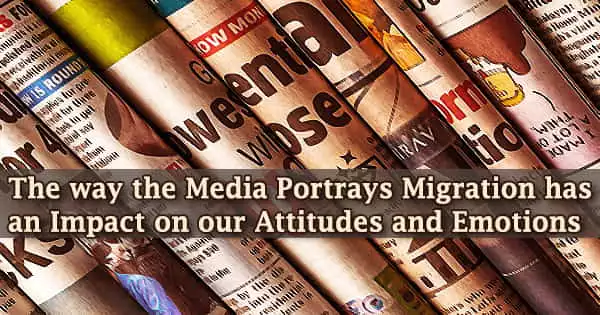News that portrays migration in a positive light makes us more optimistic about it, and vice versa. Nora Theorin makes this point in a new dissertation on media and migration at the University of Gothenburg’s Department of Journalism, Media, and Communication.
Human migration is the permanent change of residence of a person or a group; it excludes temporary movements such as nomadism, migrant labor, commuting, and tourism. The vast majority of migrants cross international borders in search of improved economic and social prospects.
Others are compelled to flee disasters. Xenophobia and calls for border tightening have risen as a result of the current large movement of refugees and displaced persons. When it comes to molding people’s opinions of migration, the media is frequently stated to play a key role, but our understanding of HOW and WHEN they impact people, and why, is limited.
People who have been forcibly moved as slaves or prisoners, or who have been ejected by governments during war or other political upheavals, are the most common victims of forced migrations. Voluntary migrations of refugees fleeing war, famine, or natural calamities fall somewhere in between these two types.
Nora Theorin looked at what it’s like in six European countries to see whether there are any common patterns or mechanisms, despite the fact that their opinions toward migration are very different: Poland, Spain, the United Kingdom, Sweden, Germany, and Hungary.
Differences between traditional and alternative media
Despite the fact that the study was conducted during the period 2014–2016 when Sweden received an unusually large number of refugees (160,000), traditional news media did not appear to have had a significant impact on viewers’ attitudes regarding migration.
Emotions seem to be an important mechanism and can function as so-called mediating variables or factors that explain why people are influenced by the media’s representations of immigration.
Nora Theorin
On the other side, it was discovered that people who used particular media with a strong political leaning had more effect. Those who read Avpixlat (now Samhällsnytt), an alternative right-wing site, got more negative about immigration from countries outside the EU, while those who read the left-wing ETC became more enthusiastic.
“You need to be aware of this difference when talking about public opinion and the influence of the media in migration issues, especially since media with a clear political, especially immigration-critical, profile have increasingly established themselves as sources of information in many Western democracies,” says Nora Theorin.
Emotions matter
To see if how the media presents immigrants and immigration matters, she performed an experiment in which 5,510 individuals from various nations were exposed to both positive and negative articles about immigrants, which elicited a range of emotions.
Various angles (or frames) elicited different responses; those in which immigrants were depicted in a good light lessened readers’ negative feelings, resulting in more positive attitudes. At the same time, those who read unfavorable articles experienced lower happy feelings and had more negative opinions regarding immigration.
“Emotions seem to be an important mechanism and can function as so-called mediating variables or factors that explain why people are influenced by the media’s representations of immigration,” says Nora Theorin.
Media use and threats
Internationally, it has also been discovered that the media, depending on where the migrants originate from, appears to trigger people’s opinions of immigration as a threat to the economy, security, and culture in various ways.
The sole apparent negative effect of European migration was on the economy, while immigration from beyond Europe was mostly connected with cultural challenges.
“But the results differ so much between the countries that it is not possible to talk about any universal influence or common patterns,” says Nora Theorin.
In general, the media’s impact was less than she had anticipated, both in Sweden and worldwide. Something Theorin feels is due to the fact that many people had already formed such strong views about migration long before the study that they are difficult to modify.
















